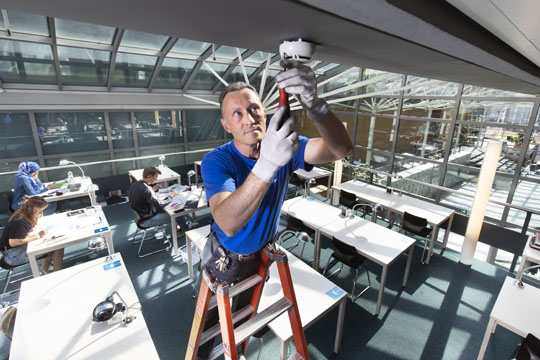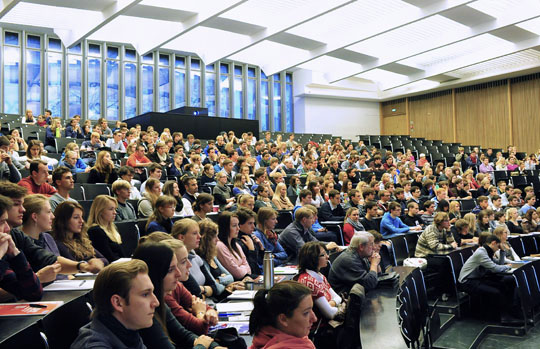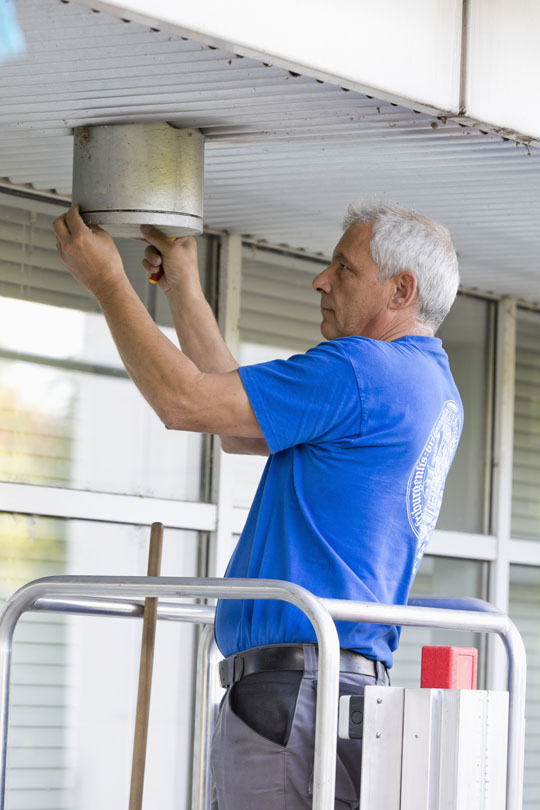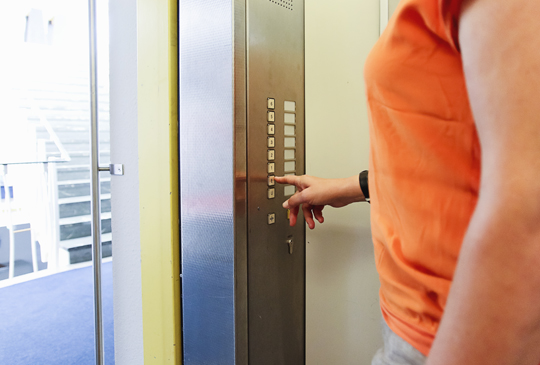Light, Air, Elevators
Freiburg, Aug 27, 2018
Until the end of the 1950s, it was only the janitors who took care of lighting, radiators and toilets in all University of Freiburg buildings. Since then, technical support has become more and more differentiated: In the Technical Building Management (TGM) department, a team of 59 engineers, technicians and craftsmen today ensure that learning and working on campus can be carried out without a hitch.
 Around 25,000 smoke detectors are installed in the lecture halls, seminar rooms and laboratories at the University. The TGM tests them every three months to ensure they are working properly and once a year if they get set off in the event of emergency. Photo: Jürgen Gocke
Around 25,000 smoke detectors are installed in the lecture halls, seminar rooms and laboratories at the University. The TGM tests them every three months to ensure they are working properly and once a year if they get set off in the event of emergency. Photo: Jürgen Gocke
“We are just a cog in the machine at the University,” says TGM director Günter Kürschner. “But it has to operate well because teaching and research wouldn’t work without us.”
Apart from the two assistants in the technical office, the department is purely a man’s world because so far simply no women have applied for vacancies. The team works hand in hand with three other service providers: the maintenance service, which is what janitors are called today, the data center and the institute technology, which is responsible among other things for the large devices in the respective institutes.
Insourcing is the name of the game
Previously referred to as “Technical Headquarters” because there was not nearly as much to handle back then as it has today, the TGM celebrated its 60th birthday in May 2018. Compared to the last 500 years, the University of Freiburg has experienced rapid changes over the past five to six decades. The TGM knows a thing or two about that: a new faculty emerges here, a new University library there and the campus now spans across 520,000 square meters with 183 buildings. The TGM manages all of it with the exception of 24 rented properties that make up about two percent of the total area.
Not only have new buildings been added to the mix, their technical facilities have also become more complex. In 1958, just under 20 percent of the total cost of new construction was spent on it; today, half is spent on technology alone. And it requires regular and fast maintenance if a problem arises - always in accordance with the latest regulations for hygiene, fire protection and energy savings.
 Opening windows and airing out the room is a thing of the past: In modern lecture halls, sensors constantly measure the fluctuating carbon dioxide content of the air, depending on the number of people present, and control the supply of fresh air accordingly. The TGM takes care of the regular maintenance. Photo: Thomas Kunz
Opening windows and airing out the room is a thing of the past: In modern lecture halls, sensors constantly measure the fluctuating carbon dioxide content of the air, depending on the number of people present, and control the supply of fresh air accordingly. The TGM takes care of the regular maintenance. Photo: Thomas Kunz
Because things are getting more and more complex, Kürschner has just divided his team into highly specialized teams for refrigeration, ventilation, plumbing, heating, electrical engineering, emergency power and more. After all they want to do as much as they can themselves. Insourcing, not outsourcing is the motto. Two teams are responsible for the buildings at the airfield and know everything - supported by the specialists’ expertise. Since 2015, the TGM team has been beefed up with seven new employees, and it is unlikely that the team’s growth will end any time soon. After seeking asylum in various basements, the TGM now has a permanent home in the Weismann house on the Natural Sciences campus.
 Energy consumption at the University is that of a small city. The TGM is always on the look out for energy savings. The 237 outdoor lights alone consumed as much electricity in 2011 as 62 single-family homes did. Today’s consumption is comparable to that of 17 single-family homes - using cost-effective 23-watt LED bulbs. Photo: Jürgen Gocke
Energy consumption at the University is that of a small city. The TGM is always on the look out for energy savings. The 237 outdoor lights alone consumed as much electricity in 2011 as 62 single-family homes did. Today’s consumption is comparable to that of 17 single-family homes - using cost-effective 23-watt LED bulbs. Photo: Jürgen Gocke
Eye wash and air conditioning
People won’t find an “office machine workshop” here anymore, as it was called in the 1980s. The staff consisted of three people, then down to one in the final days. In its heyday, every typist would bring his or her typewriter and calculating machine to the workshop for maintenance at the beginning of vacation. TGM technicians no longer have to worry about writing instruments. As one of the other technical service providers, the IT services is now responsible for providing the networks for the beautiful new world of digital communication. But even that depends on the fact that electricity flows reliably and that warmed up operating devices are cooled. Last but not least, experts from the TGM have an eye on the recooling systems installed on the roofs for the air conditioning systems, so that staff and the public can count on their remaining hygienically sound.
 The TGM has to perform safety maintenance for more than 100 elevators annually: Are the traction ropes in perfect condition? Is the controller OK? In case of fire, an elevator automatically moves to an evacuation floor.
The TGM has to perform safety maintenance for more than 100 elevators annually: Are the traction ropes in perfect condition? Is the controller OK? In case of fire, an elevator automatically moves to an evacuation floor.
Photo: Sandra Meyndt
It is unlikely that the TGM team will get bored any time soon because the group works together with a variety of people and departments. Coordination issues can arise easily at those intersections, reports Kürschner. And because the 53-year-old, who came to Freiburg from Göttingen in Freiburg in 2009, is not only an engineer, but also a manager, he strives for more efficient processes. For example, he wants to bring the databases up to date via the existing technology and recruit a contact person for each building, who can coordinate internal and external communication with the TGM. For example, if, as was the case recently, the eye wash in one of the biology or chemical laboratories does not spray high enough. In an emergency, these devices must be able to immediately neutralize chemicals that have been accidentally detected. The laboratory users have checked all “rescue devices.” Only a small part was faulty – the TGM made sure it was back in working order.
However, it is not always the technology that causes grief, says Kürschner, who complains that some users carelessly or even destructively deal with the existing infrastructure. The result: smeared walls, damaged doors and sinks. Although it is still better here than at other universities in Freiburg. “But over the past three years we have been experiencing increased vandalism, which places a large burden on our department.” Such things have maxed out TGM’s capacity, which is why Kürschner and his staff are in favor of closing the university library at night, when only a few work there. “It cannot be that the building is made unlimitedly available.” Günter Kürschner is also concerned with the economical use of resources - including those of his employees.
Anita Rüffer

